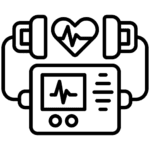A nebulizer is a device used to administer medication in the form of a mist inhaled into the lungs. This medical device is especially useful for individuals with respiratory conditions such as asthma, chronic obstructive pulmonary disease (COPD), or cystic fibrosis. The nebulizer helps deliver medication directly to the lungs, which makes it more effective for treating conditions affecting the airways and lungs.
If you’re considering purchasing a nebulizer, it’s important to evaluate several key factors to ensure that you choose the right one for your needs. Below, we’ll walk through the essential considerations to help you make an informed decision before purchasing a nebulizer.
1. Types of Nebulizers
There are different types of nebulizers, and understanding the differences between them is the first step in selecting the right device for you. The main types of nebulizers are:
- Compressor Nebulizers: These are the most common and traditional type. They work by using compressed air to convert liquid medication into a mist that can be inhaled. These devices are often larger and may require a power source, either through electricity or batteries. They are reliable and commonly used in both hospital and home settings.
- Ultrasonic Nebulizers: These nebulizers use high-frequency sound waves to turn liquid medication into a mist. They are quieter than compressor nebulizers and can be more efficient. However, they are typically more expensive and might not work with all types of medication.
- Mesh Nebulizers: These are compact, portable, and more efficient than the other types. They work by vibrating a mesh to create a fine mist. Mesh nebulizers are often used for quick, on-the-go treatments, making them ideal for active individuals or travelers.
When deciding, consider the specific needs of the patient (whether the treatment is for a child, elderly person, or someone with mobility limitations) and choose the type that best fits those needs.
Example:
If you need a device for at-home, nightly treatments and have access to a power source, a compressor nebulizer may be ideal. However, for someone who travels frequently, a mesh nebulizer may offer the convenience of portability.
2. Ease of Use
The ease of use is another critical consideration when purchasing a nebulizer. A nebulizer should be simple to set up, operate, and clean. You should look for a device that comes with clear instructions and is easy to handle, especially for elderly or children who may require assistance.
Here are a few aspects to consider:
- Control Panel: Some nebulizers come with a straightforward on/off switch, while others may have multiple settings for different medication types or treatment lengths. For ease of use, it’s important to select a model with a control panel that suits the user’s preferences.
- Portability: If you plan to use the nebulizer while traveling, consider a portable model that is lightweight, compact, and easy to carry.
- Noise Level: Some nebulizers can be quite noisy, which may be uncomfortable, especially for children or elderly patients. Look for a quiet nebulizer, particularly if it will be used frequently at night.
- Cleaning: Frequent cleaning of the nebulizer is essential to prevent bacterial buildup and maintain hygiene. Some nebulizers are easier to clean, with parts that can be detached and washed, while others may require more time-consuming cleaning procedures. Check if the nebulizer has dishwasher-safe parts for added convenience.
Example:
If you’re purchasing a nebulizer for a child, a quiet, lightweight model that is easy to clean and use might be best, so they feel comfortable during treatments.
3. Medication Compatibility
Not all nebulizers are compatible with every type of medication. Some medications require specific types of nebulizers, so it’s essential to check whether the device is suitable for the medication you will be using.
- Medication Types: Most nebulizers work with liquid forms of medications such as bronchodilators, steroids, or antibiotics. However, some nebulizers may not be able to handle thicker medications or specific types of inhalers.
- Volume of Medication: Consider the volume of medication that the nebulizer can accommodate. Some models have larger medication cups, which can hold a greater amount of medication, reducing the need for refills during longer treatments.
- Medication Delivery: Look for nebulizers that offer an efficient delivery system, ensuring that the medication is properly atomized into tiny particles for effective delivery to the lungs.
Example:
If your healthcare provider prescribes a specific medication that needs to be vaporized into a fine mist for inhalation, ensure that the nebulizer you choose is compatible with that medication.
4. Size and Portability
Size and portability are key factors, especially if you need to travel with your nebulizer. For patients who only use the nebulizer at home, a larger unit with more advanced features may be acceptable. However, for those who require portability, such as individuals who travel frequently, a smaller, more compact model would be better.
- Portable Nebulizers: These are typically smaller and powered by batteries, which makes them ideal for use outside the home, such as at work, school, or on the go.
- Home Nebulizers: Larger models typically offer more features, such as faster nebulization times and greater medication capacity. These units are often plugged into a power source and can be used in a stationary environment.
- Battery Life: For portable nebulizers, check how long the battery lasts and whether it can be easily recharged or replaced. Longer battery life is especially important for frequent travelers.
Example:
If you need a nebulizer for occasional use while traveling, a portable, battery-powered mesh nebulizer would be a good fit. For nightly treatments at home, a larger, compressor-style nebulizer may be more suitable.
5. Treatment Time and Efficiency
Treatment time is another essential factor when choosing a nebulizer. While some nebulizers take longer to deliver medication, others are faster. Depending on your needs, you may want to select a model that offers a quicker treatment time, especially for busy individuals or children who might become restless.
- Nebulizer Flow Rate: The flow rate, measured in liters per minute (LPM), determines how quickly the medication is converted into a mist. A higher flow rate usually means faster treatments.
- Efficiency: The efficiency of a nebulizer is measured by how much of the medication reaches the lungs. Some nebulizers deliver a higher percentage of medication to the lungs, reducing waste and making treatments more effective.
Example:
A mesh nebulizer typically provides faster medication delivery and more efficient mist generation, making it ideal for individuals who need quick treatments, such as those with asthma attacks.
6. Cost and Warranty
The cost of a nebulizer can vary significantly depending on the type, features, and brand. While it’s important to find a nebulizer within your budget, don’t forget to consider long-term costs, such as replacement parts or filters.
- Initial Cost: Entry-level nebulizers, particularly manual or simple compressor models, are often more affordable. Ultrasonic and mesh nebulizers are generally more expensive due to their advanced technology and portability features.
- Replacement Parts: Consider the cost and availability of replacement parts such as nebulizer cups, tubing, filters, and mouthpieces. Some models require more frequent replacements than others.
- Warranty: Choose a nebulizer with a good warranty. A longer warranty can give you peace of mind and protection in case the device malfunctions. Some models offer warranties up to three years or more.
Example:
If you choose a higher-end nebulizer, such as a mesh or ultrasonic model, check if it includes a warranty for any potential malfunctions and if the parts are easily accessible for replacement.
FAQs About Nebulizers
1. What is the purpose of a nebulizer?
A nebulizer is used to administer liquid medication in the form of a mist that can be inhaled into the lungs. It’s typically used for patients with respiratory conditions like asthma, COPD, or cystic fibrosis.
2. Which type of nebulizer is the best?
The best nebulizer depends on the user’s needs. Compressor nebulizers are traditional and reliable, ultrasonic nebulizers are quieter and faster, while mesh nebulizers are compact, portable, and efficient. Choose based on your lifestyle and treatment requirements.
3. Can all medications be used with any nebulizer?
No, not all nebulizers are compatible with all medications. Some medications, such as thick liquids, may not be suitable for certain types of nebulizers. Always check compatibility with your healthcare provider.
4. How do I clean my nebulizer?
Cleaning varies depending on the model, but most nebulizers require washing the medication cup, mouthpiece, and tubing with warm water and soap after each use. Be sure to dry the parts thoroughly before the next use.
5. How long does a nebulizer treatment take?
Treatment time can vary based on the nebulizer type and flow rate. On average, a treatment takes about 10 to 15 minutes. Mesh and ultrasonic nebulizers tend to be faster than traditional compressor models.
6. Can I travel with a nebulizer?
Yes, portable nebulizers are designed for travel and can run on batteries. If you plan to travel, consider a battery-powered or rechargeable mesh nebulizer for convenience.
7. How do I choose the right nebulizer for my child?
When choosing a nebulizer for a child, look for models that are quiet, easy to use, and portable. A child-friendly design and small size are important factors to ensure the device is both comfortable and effective for them.
 Hospital Furniture
Hospital Furniture Medical Devices
Medical Devices MSR Products
MSR Products Office Furniture
Office Furniture